US Welcomes Saudi Invitation To Yemen's Houthis For Talks

The United States on Friday welcomed Saudi Arabia's invitation to Yemen's Iran-backed Houthis for talks in Riyadh and described it as an "important step towards peace."

The United States on Friday welcomed Saudi Arabia's invitation to Yemen's Iran-backed Houthis for talks in Riyadh and described it as an "important step towards peace."
Yemen's Houthi delegation to Riyadh to continue ceasefire talks this week. The kingdom wanted to resume joint efforts with Oman to "reach a permanent and comprehensive ceasefire in Yemen and a sustainable political solution acceptable to all Yemeni parties," Saudi Arabia's state news agency said on Thursday.
The peace initiatives have gained momentum since arch-rivals Saudi Arabia and Iran agreed to re-establish ties in a deal brokered by China in March. A permanent ceasefire in Yemen would mark a milestone in stabilizing the Middle East.
"This important step towards peace expands on a series of engagements between Saudi Arabia and the Houthis," the US State Department said on Friday.
"The talks in Riyadh follow a visit by senior US officials to Saudi Arabia, Oman, and the United Arab Emirates last week to consult with our regional partners and the Yemeni parties about a viable path toward peace."
Iran has been supporting the Houthis since the conflict flared up in 2014. Tehran has evidently delivered small and large weapons to Houthis, as well as providing training. Houthis attacked Saudi Arabia multiple times with drones and ballistic missiles.
The trip marked the first official visit by Houthi officials to the kingdom since the war broke out in Yemen in 2014, after the Iran-aligned group ousted a Saudi-backed government in Sanaa.
The group has been fighting against a Saudi-led military alliance in a conflict that has killed hundreds of thousands and left 80% of Yemen's population dependent on humanitarian aid.
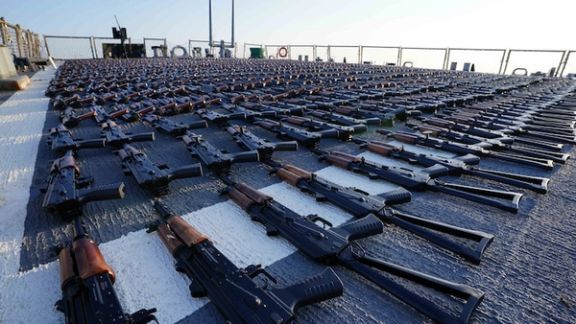
Saudi Arabia invited Yemen's Iran-backed Houthis to Riyadh to continue ceasefire talks, the state news agency SPA reported on Thursday.
The kingdom wanted to resume efforts helped by Oman to "reach a permanent and comprehensive ceasefire in Yemen and a sustainable political solution acceptable to all Yemeni parties," SPA added.
Mohamed Ali al-Houthi, head of the Houthi supreme revolutionary committee, said late Thursday that talks were continuing between Sanaa and the Saudi Arabia with Omani mediation.
The discussions included "paying salaries of the Yemeni employees, opening airports and ports, releasing all prisoners and detainees, the exit of foreign forces, and reconstruction leading to a comprehensive political solution," he said.
The Houthi al-Masirah TV reported earlier on Thursday that a delegation left Sanaa and was on its way to Riyadh to continue the negotiations.
The trip will be the first official visit by Houthi officials to the kingdom since the war broke out in Yemen in 2014, after the Iran-aligned group ousted a Saudi-backed government in Sanaa.
The peace initiatives have gained momentum since arch-rivals Saudi Arabia and Iran agreed to re-establish ties in a deal brokered by China. A permanent ceasefire in Yemen would mark a milestone in stabilizing the Middle East.
The first round of the Oman-mediated consultations between Riyadh and Sanaa, which are running in parallel to UN peace efforts, was held in April when Saudi envoys visited Sanaa.
The group has been fighting against a Saudi-led military alliance since 2015 in a conflict that has killed hundreds of thousands and left 80% of Yemen's population dependent on humanitarian aid.
Reporting by Reuters

Britain, France and Germany will retain ballistic missile and nuclear proliferation-related UN sanctions on Iran, set to expire in October under the 2015 Iran nuclear deal.
Reuters reported in June that European diplomats had told Iran they planned to keep the measures.
"In direct response to Iran’s consistent and severe non-compliance with its JCPoA commitments since 2019, the governments of France, Germany, and the United Kingdom intend to maintain nuclear proliferation-related measures on Iran, as well as arms and missile embargoes, after Joint Comprehensive Plan of Action (JCPoA) Transition Day on 18 October 2023," a spokesperson for the three countries, known as the E3, said in a statement.
European sources had cited three reasons for keeping the sanctions: Russia's use of Iranian drones against Ukraine; the possibility Iran might transfer ballistic missiles to Russia; and depriving Iran of the nuclear deal's benefits given Tehran has violated the accord, albeit only after the United States did so first.
The US withdrew from the accord in May 2018, demanding a tighter nuclear deal and a change in Iran’s regional behavior and ballistic missile program.
Once the US imposed tough sanctions on Iran’s oil exports, Tehran began breaching JCPOA limits on its uranium enrichment. It intensified the violation in early 2021, after the Biden administration announced its readiness to negotiate and return to the JCPOA.
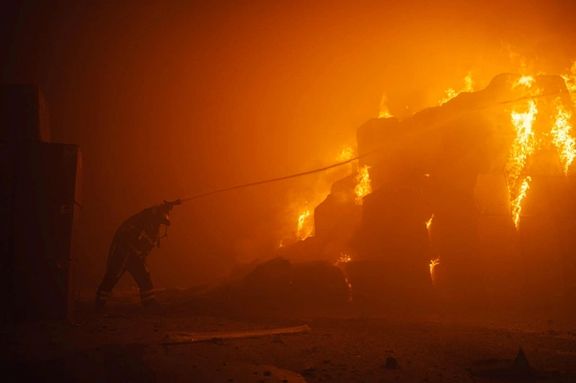
Iran rejected the European decision as "illegal and provocative".
"Undoubtedly, Iran will respond appropriately to this .... action which clearly violates the obligations of the EU, France, Germany and Britain under the JCPOA and the Resolution 2231," Iran's foreign ministry said in a statement, referring to the UN resolution that endorsed the 2015 nuclear pact.
The deal's coordinator, EU foreign policy chief Josep Borrell said he had received a letter from the E3 informing him of their decision and transferred it to Iran, China and Russia, the other participants to the deal.
"As Coordinator, I will consult with all JCPoA participants on the way ahead," he said.
Keeping the sanctions would reflect Western efforts to prevent Iran from developing nuclear weapons and the means to deliver them despite the collapse of the 2015 deal.
It also reflects fears of missile proliferation, with Iran already having supplied hundreds of kamikaze drones to Russia that have targeted infrastructure and cities.
The JCPoA agreed with Iran in 2015 envisaged a "Transition Day" eight years later, when remaining ballistic missile and nuclear-related sanctions on Iran would be lifted.
But Britain, France and Germany will now transfer UN sanctions on Iran that are due to be lifted next month into domestic law, while Britain and the EU will retain existing sanctions, Britain's Foreign office said in a statement.
The crux of the JCPOA pact, which Iran made with Britain, China, France, Germany, Russia and the U.S., limited Tehran’s nuclear program making it harder for it to get fissile material for a bomb in return for relief from economic sanctions.
As a result of Trump’s withdrawal from the deal and US President Joe Biden’s failure to revive it, Iran could make the fissile material for one bomb in 12 days or so, according to US estimates, down from a year when the accord was in force.
"Our commitment to finding a diplomatic solution remains. This decision does not amount to imposing additional sanctions nor to triggering the snapback mechanism. We stand ready to reverse our decision, should Iran fully implement its JCPoA commitments," the E3 said, referring to a mechanism that would immediately restore all UN sanctions against Iran.
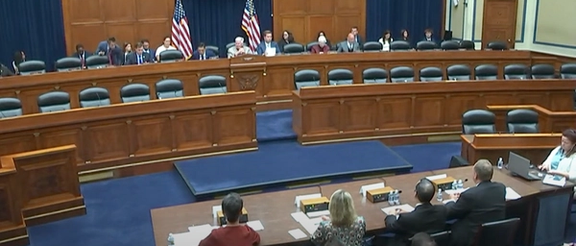
US lawmakers convened Wednesday to examine the Biden administration’s secrecy and “failures” on Iran, calling it a “dangerous” strategy.
The Subcommittee on National Security, the Border, and Foreign Affairs – part of the House Oversight Committee – held the hearing to discuss Washington’s secret dealings with the regime, including Tehran’s nuclear program and negotiations for the release of American hostages in exchange for billions of dollars as well as the circumstances surrounding the dismissal of the Special Envoy on Iran, Robert Malley.
In his opening remarks, Chairman Glenn Grothman (R-Wis) emphasized that the Biden Administration has failed to be transparent with Congress and the American people on talks and actions regarding the Iranian regime. He condemned the White House for a sanctions waiver as part of its prisoner swap on the anniversary of September 11, freeing up $6 billion for “the world’s largest state sponsor of terrorism.”
Decrying the 2015 nuclear deal signed under the Obama administration, Grothman said “the Joint Comprehensive Plan of Action, or JCPOA, was touted by the left as the fix-all to the Iranian nuclear dilemma. In reality, it did little to reign in the Iranian regime while rewarding it with literal pallets of cash.”
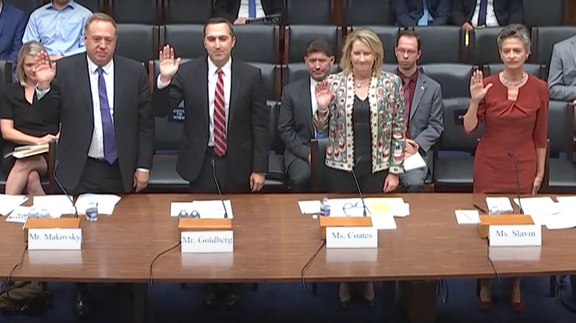
He continued that the Trump administration withdrew the US from the deal “due to Iran’s continued bolstering of its ballistic missile program and its funding of terrorist groups around the globe” and that the current administration has failed to uphold its pledge to return the US to the JCPOA. “Instead, the administration has negotiated in secret and has failed to be transparent” despite the Iran Nuclear Agreement Review Act’s expansive disclosure requirements.
“In March 2023, the International Atomic Energy Agency detected enriched uranium particles at 83.7 percent, prompting great concern as weapons grade uranium is enriched at 90 percent or higher. In addition to its nuclear program, Iran continues work to perfect its ballistic missile program. In May of this year, Iran unveiled its 4th generation liquid fuel ballistic missile, which can carry a 1,500-kilogram warhead around 1,200 miles,” he pointed out.
Grothman highlighted that “Iran’s Revolutionary Guard Corps, or the IRGC, continues to provide arms, training, and financial support to militias and terrorist organizations in Bahrain, Iraq, Lebanon, Palestine, Syria, and Yemen,” mentioning that the IRGC provides the terrorist organization Hezbollah $700 million a year in assistance.
“Since President Biden took office, Iran or its proxies have attacked US forces in the Middle East almost 100 times,” he noted.
On the prisoner swap deal, he said the White House claims the $6 billion could only be used for humanitarian purposes but Iran says it will decide how to spend the money. He stressed the necessity to “ensure that the increase in ransom payments does not incentivize hostile nations like Iran to continue to kidnap American citizens.”
Referring to the suspension of Iran envoy, Robert Malley, which he called “highly unusual”, he said Malley's career has been marked by a “long history of appeasement toward adversaries of the US, and mentioned his repeated meetings with the terrorist organization Hamas under the Obama administration and Iran’s former Foreign Minister Javad Zarif “to undermine President Trump’s maximum pressure campaign against Iran.”
Speaking as one of the expert witnesses at the hearing, Jewish Institute for National Security of America (JINSA) President Michael Makovsky said the Biden administration has not articulated any strategic goal toward Iran, elaborating that in its National Security Strategy, the administration only outlined a series of policies.
He noted that the administration endlessly pursued diplomacy at the exclusion of other tools, an approach which “even enriches and strengthens the regime ... The administration accepts the regime’s existence, works with it and mutes criticism of its awful human rights abuse.”
The US only retaliated to four of Iran’s nearly 100 attacks on US forces in the region, he said, adding that “Iran has even retaliated against US forces for Israeli actions because it fears Israel and not America." So laxly enforced are the sanctions that is has resulted in a triple rise in Iranian oil export revenues in 2023 in comparison to 2020, Makovsky stressed.
Richard Goldberg -- from the Foundation for the Defense of Democracies – described the recent unacknowledged deal with Iran as “a perilous arrangement negotiated in secret, without congressional oversight or review, in breach of statutory requirements.” Secret talks took place against the backdrop of continued attempts by the regime in Tehran to assassinate former US officials and kidnap or kill Iranian Americans on US soil, he added.
He said that it defies logic to believe that the US is paying $6 billion for five people, making it “a historic hostage ransom payment.” Considering other concessions given to Iran such as a waiver of $10 billion of Iran’s oil money blocked in Iraq and a special drawing rights of the IMF for fiat currency of about $7 billion, and $25 billion of oil revenues through a lax enforcement of sanctions that has led to record high export of oil to China, “this is not a $6-billion deal... this could be at least a $50 billion deal.”
“America is paying Iran’s extortion racket, ceding to Tehran nuclear threshold status just to avoid making tough decisions before next year’s presidential election," he stated.

A prisoner swap between the US and Iran is set to happen next week, possibly on September 18, on the eve of the United Nations General Assembly meeting in New York.
The exchange is viewed as a preliminary step towards initiating fresh discussions aimed at reinstating limitations on Iran's nuclear program, reported Bloomberg.
As part of the agreement, the United States is also allowing Iran to access $6 billion in previously frozen funds held in South Korea.
The move by President Joe Biden's administration has drawn criticism, with some arguing that it may encourage further hostage-taking incidents.
In response, National Security Council spokeswoman Adrienne Watson emphasized that the primary objective is the release of five Americans who are “wrongfully” detained, emphasizing that this remains an ongoing and sensitive process. She clarified that no individuals will be transferred into US custody this week.
The Biden administration has refuted Iran's assertions that there will be no restrictions on the $6 billion in oil sales proceeds, asserting that the funds are earmarked exclusively for humanitarian purposes.
In support of the pending prisoner swap involving five Americans and five Iranians, Secretary of State Antony Blinken has informed Congress about a waiver ensuring that German, Irish, Qatari, South Korean, and Swiss banks can facilitate the transfer of the $6 billion from South Korea without violating US sanctions.
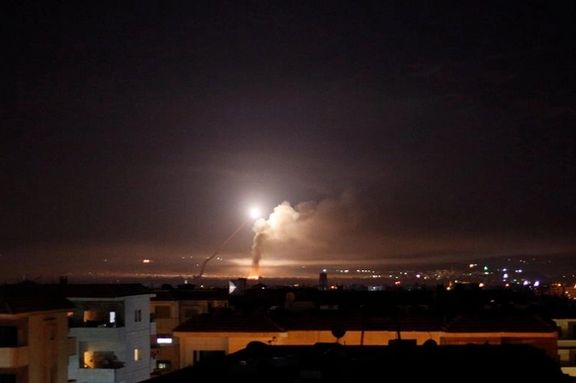
Israeli airstrikes on Wednesday killed two Syrian soldiers and injured six more, according to state media, citing a military source.
The source detailed the attack originating from the Mediterranean Sea and targeting Syrian air defense installations in Tartus on the West coast.
"At exactly 17:22 (14:22 GMT) this afternoon, the Israeli enemy carried out strikes," stated the official news agency SANA. "The aggression led to the death of two soldiers and wounded six others," it continued.
Throughout the course of more than a decade of conflict in Syria, neighboring Israel has launched numerous airstrikes within Syrian territory. The operations have predominantly focused on Iran-backed forces, Hezbollah militants, and Syrian military positions.
The Syrian Observatory for Human Rights, an organization monitoring the conflict, reported that the airstrikes on Wednesday also hit a weapons depot associated with the Iran-backed Hezbollah group. The British-based monitor, which maintains sources within Syria, confirmed the fatalities of the two soldiers. Additionally, an unidentified fighter was killed "in attacks believed to be Israeli missile fire."
Israel typically refrains from commenting on specific airstrikes carried out in Syria. However, it has consistently asserted its stance of preventing Iran, a key supporter of the Syrian government, from expanding its influence in the region.
Since the outbreak of the Syrian conflict in 2011, it has resulted in the deaths of over half a million people, originally sparked by the suppression of pro-democracy protests.






